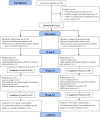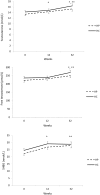Long-Term Effects of a Randomised Controlled Trial Comparing High Protein or High Carbohydrate Weight Loss Diets on Testosterone, SHBG, Erectile and Urinary Function in Overweight and Obese Men
- PMID: 27584019
- PMCID: PMC5008754
- DOI: 10.1371/journal.pone.0161297
Long-Term Effects of a Randomised Controlled Trial Comparing High Protein or High Carbohydrate Weight Loss Diets on Testosterone, SHBG, Erectile and Urinary Function in Overweight and Obese Men
Abstract
Introduction: Obesity is associated with reduced testosterone and worsened erectile and sexual function in men. Weight loss improves these outcomes. High protein diets potentially offer anthropometric and metabolic benefits, but their effects on reproductive and sexual outcomes is not known.
Aim: To examine the long-term effects of weight loss with a higher protein or carbohydrate diet on testosterone, sex hormone binding globulin, erectile dysfunction, lower urinary tract symptoms and sexual desire in overweight and obese men.
Methods: One-hundred and eighteen overweight or obese men (body mass index 27-40 kg/m2, age 20-65 years) were randomly assigned to an energy restricted higher protein low fat (35% protein, 40% carbohydrate, 25% fat; n = 57) or higher carbohydrate low fat diet (17% protein, 58% carbohydrate, 25% fat, n = 61) diet for 52 weeks (12 weeks weight loss, 40 weeks weight maintenance). Primary outcomes were serum total testosterone, sex hormone binding globulin and calculated free testosterone. Secondary outcomes were erectile function as assessed by the International Index of Erectile Function (IIEF) (total score and erectile function domain), lower urinary tract symptoms and sexual desire.
Results: Total testosterone, sex hormone binding globulin and free testosterone increased (P<0.001) and the total IIEF increased (P = 0.017) with no differences between diets (P≥0.244). Increases in testosterone (P = 0.037) and sex hormone binding globulin (P<0.001) and improvements in the total IIEF (P = 0.041) occurred from weeks 0-12 with a further increase in testosterone from week 12-52 (P = 0.002). Increases in free testosterone occurred from week 12-52 (p = 0.002). The IIEF erectile functon domain, lower urinary tract symptoms and sexual desire did not change in either group (P≥0.126).
Conclusions: In overweight and obese men, weight loss with both high protein and carbohydrate diets improve testosterone, sex hormone binding globulin and overall sexual function.
Trial registration: Anzctr.org.au ACTRN12606000002583.
Conflict of interest statement
The authors have declared that no competing interests exist.
Figures


References
-
- Ng M, Fleming T, Robinson M, Thomson B, Graetz N, Margono C, et al. (2014) Global, regional, and national prevalence of overweight and obesity in children and adults during 1980–2013: a systematic analysis for the Global Burden of Disease Study 2013. Lancet 384: 766–781. 10.1016/S0140-6736(14)60460-8 - DOI - PMC - PubMed
-
- Kolotkin RL, Zunker C, Ostbye T (2012) Sexual functioning and obesity: a review. Obesity (Silver Spring) 20: 2325–2333. - PubMed
-
- Rohrmann S, Smit E, Giovannucci E, Platz EA (2004) Associations of obesity with lower urinary tract symptoms and noncancer prostate surgery in the Third National Health and Nutrition Examination Survey. Am J Epidemiol 159: 390–397. - PubMed
Publication types
MeSH terms
Substances
LinkOut - more resources
Full Text Sources
Other Literature Sources
Medical
Miscellaneous

